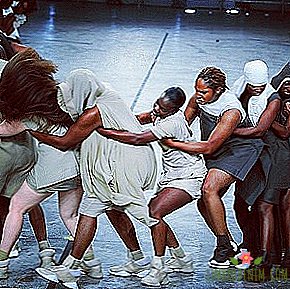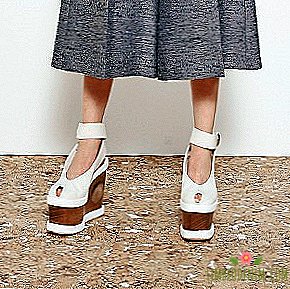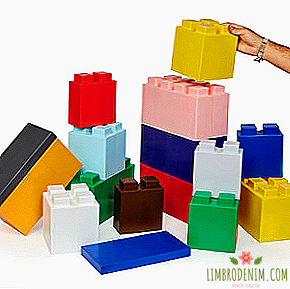"Wow, girl with a wand": How do I live with rheumatoid arthritis
Rheumatoid arthritis is an autoimmune disease.which primarily affects the joints and is more common in women. If arthritis begins in childhood, it is called juvenile; the disease can proceed in different ways, and its causes are not yet known. Both rheumatoid arthritis itself and drugs for its treatment lead to noticeable changes in appearance and physical limitations. Psychologist Dasha Krajukhina talks about life with this disease and how not to talk to people who have a similar diagnosis.

Olga Lukinskaya
About disease and bureaucracy
I am twenty-six years old, and twenty-five of them I have rheumatoid arthritis. The onset of the disease was completely "classic": there was pain, then a high, under forty, fever, which did not stray. This is an autoimmune disease, in which a very strong inflammation develops - therefore, the symptoms are such as pain and high fever. It was 1993, the health care system was falling apart along with everything else, but I was lucky - the diagnosis was made in just six months. I know that in other families this process could have lasted two years; I think it played a role that we lived in Moscow, and the connections between father and grandfather also helped.
At first I was in an infectious diseases hospital, then someone advised me to go to the Institute of Rheumatology at Kashirka - and there they immediately realized that I was their patient. Very quickly, hormone therapy was started in high doses - it is still the most effective means of suppressing such autoimmune processes. True, hormones suppress everything else, growth slows down, therefore people with RA have a distinctive appearance - you are always one and a half to two heads lower than your peers, your face becomes round and plump.
The treatment goes all my life, I received hormonal therapy for up to twenty-three years. Now there is a new class of drugs - biological agents that act on disruptions in the immune system to a point; Thanks to these drugs, I was able to cancel hormones. I receive treatment once a month, it is an IV drip; one dose of such an intravenous medicine costs about 70 thousand rubles. The treatment is carried out at the expense of the state, that is, there is no need to pay, but the bureaucratic process leaves much to be desired. It is necessary to receive monthly prescriptions through the head of the polyclinic, then go to issue them and confirm to the rheumatological center, then after the preparation to a special pharmacy. You can enter it only under the supervision of a rheumatologist, that is, every time you take out a day at the hospital, and this is still a lot of paper. The drug is serious, and to control undesirable effects, you need to donate blood every month and every six months to undergo screening for tuberculosis.
People with RA have a distinctive appearance - you are always one and a half to two heads lower than your peers, your face becomes round and plump
I underwent three operations on prosthetic joints - I have replaced two hip and one knee. If you are sick from childhood and take hormones, then, as a rule, it is time for prosthetics to reach the age of twenty - they are completely destroyed, cartilage is erased. This is also done by quota, otherwise it is not less than a million rubles. The hip joints were in terrible condition, I understood that they need to be changed exactly; and after their prosthetics, I had a very strong aggravation of the knees - severe inflammation, swelling. One knee was operated, the second one is ahead. I realized that it was necessary to do this in a relatively warm season: the joints should be developed, and it is impossible to walk in the winter, there is no such clothing and footwear that bandaged legs fit into. In the spring after the operation I went out in slippers, walked around the hospital.
I was lucky with the constitution, I have a good muscular corset and strong bones. Because of the large strong muscles, the knee was held in place, even when almost nothing was left of the joint. Of course, I practice, do exercises, before operations (and after) I go swimming. Swimming very well helps, especially after operations, it seems to give the body to get used to and understand that this joint is now mine.
Disability first needed to be renewed, but at nineteen years it was made indefinite. Disability is still given an individual rehabilitation plan. Everything is inscribed there - including technical means (crutches, strollers), which are provided free of charge. I wanted to get all the necessary things to the apartment, the apparatus that helps and bend the leg, and develop the joint after the operation, a normal stroller, so that after the operations I can walk in the park. But, unfortunately, they look at you at the commissions as if you want to deceive everyone - and in the end they did not give me the wheelchair, they said that it was only with a disability of the first group.
About life and pain
I walk with a cane or an elbow crutch. For long distances - only a taxi, but it does not always save: there are uncomfortable yards, where in winter it is impossible to walk even two meters by yourself. Then you need to either change plans, or come with someone from friends to help someone, or postpone things until March or April.
Whether I can use transport depends on my condition. Now half a year has passed since the last operation, and in the summer I was at sea, but it really heals me - so now I can go down and get out of the subway. But as soon as the frosts begin, I will not risk. I am well-versed in ground transportation, I need to put more time on it, but I don’t need to go down and climb stairs. We specially rented an apartment close to work, and in good condition I walk for ten minutes. After the operation I went by taxi - for two minutes and one hundred rubles.
The pain is present in my life constantly, it always goes in the background. After three operations, life has changed a lot, there were movements that were not there. The pain in these joints is gone, but even there remains muscle pain, the muscles and cartilage long stand in place. Before the operations, it was such that the knee stuck: it bent it, and it was possible to straighten it only tomorrow. So there can be no long-term planning - or rather, maybe, but everything often goes according to plan.
A person without arthritis can squat down and bend down to the floor. Sometimes, to thoroughly wash the floor, I lay my stomach on a low stool
A person without arthritis can squat, stand on a stool, take something, without hesitation, without stopping attention to it. Bending down to the floor, bending down to the child and helping him get dressed - for people with RA, this is a whole business that requires separate resources and time. Sometimes, to thoroughly wash the floor, I lay my stomach on a low stool. With girls with whom we know each other from childhood through hospitals, we have a chat "Sisters of the RA", and we often discuss life; Of course, many issues are solved by the cleaning service or things like a vacuum cleaner.
Standard kitchen furniture is inconvenient for small stature - and you cannot stand on a chair. Getting something off the top shelf is a whole adventure. I live together with my sister, she is one and a half years younger; we both work, that is, we are not always at home at the same time. And it is important to arrange life comfortably for me, so that it automatically does not remove something from the lower shelves to the upper ones. Sometimes Mom arrives, opens the cupboard and is surprised: "Why do you have empty shelves and everything is dumped on the bottom?" And my sister replies: "Mom, you forgot how it is to live with hobbits."
My height is 150 centimeters - I am tall for a person with juvenile rheumatoid arthritis; the height of my friends is from 130 to 155 centimeters. Someone manages to dress in children's stores - but not me, because I have very large breasts and a typical "female" figure. It is still very difficult to pick up shoes: the leg with arthritis is wide because the joints swell, but at the same time I wear a 34th size (and this is more than that of many girls with RA). Children's shoes are usually too narrow. There are specialty shops, but they sell very strange things - for example, some creepy heels of 33-34-th heels. So all life has to invent something.
About work
I am a psychologist at the College of Architecture and Design, teaching to future plumbers and electricians. This is an experimental educational platform, we are working on self-determination of students, we are changing the paradigm of education: we have quite specific students, in families whose profession is perceived as a means of survival and income, and not self-realization, and we are trying to change their attitude. We work so that a person can set goals, achieve them, understand what he wants, what his work can give to the world.
And my second job is support groups for parents of children with disabilities, with physical disabilities, with musculoskeletal diseases. In Moscow, there are many classrooms and support groups for parents of children with mental problems, but for systemic diseases there is no such thing. My colleague, Irina Kutilina, who is also a psychologist and has been ill since childhood (she has a mixed connective tissue disease, FHCC), wrote a program of meetings and slowly began to develop it. We are now recruiting parents into groups. We found a place where we will spend them; it will be free for parents; We also want to create a school for patients somewhere in the children's hospital. Perhaps you need to conduct classes online or do a webinar for those who live in other cities.
On the one hand, it will be a community to support each other, to see different experiences, to understand that you are not alone in your problems. On the other hand, we will give concrete knowledge about what the child lacks, what difficulties he will have in connection with the illness and attitude towards it, how to build communication with the child and his illness. Most of the problems in adolescents: they want to grow up and be separated from their parents, but when you are on crutches, strollers, medications - this is very difficult and sometimes impossible, and society does not help at all. Parents usually have very strong anxiety, which also prevents them from releasing the child.
About help and about the attitude of others
I am not ashamed to ask for help - although this is also a story connected with overcoming. There is not always a mood to approach a stranger, sometimes you want to be silent. Many of my friends can not and feel free to ask for help. We all have a constant awareness that we are very different from most people, and when you turn to "normal" people you are always ready for some kind of strange reaction - what is it, who is it here? Once again I do not want to remind myself of myself, you are afraid to face questions, misunderstanding, pity. But at the same time, I recently began to realize that such a picture is in our head, and it is far from reality.
In fact, people often do not even notice the disease, they do not even believe it. The taxi driver was somehow very surprised, I thought that I was with a wand, because I had injured my leg or something else — such a young girl cannot have a disability! We (people with RA) are accustomed to look at our joints, to be surrounded by people with the same disease. We notice it, we scan, we understand why a person is limping in one way or another. And people who have not encountered this, do not notice - for them I’m just a short girl.
Most people are friendly, they are willing to help and want to support or sympathize. True, not everyone is able to do it correctly - we often hear something like “nothing, my friend was also so sick and cured”. I also often get admiring reviews on instagram, how well I am and how a person likes my blog, and then there is a phrase that negates everything: "I thought that I had problems - but it turns out there are problems like you and you can live and not lose heart. " This makes me uncomfortable.
In diseases affecting speech (for example, cerebral palsy), people around you usually think that mental activity is also impaired. With RA there is no such thing, but everyone thinks that you are a child - short and with a round face. Now I rarely come across this, but before I was constantly called a girl, poked, lamented: "Oh, wow, the girl with the wand." I remember being about fifteen or sixteen on the subway, looking at a boy of about the same age, and I understood that he most likely perceives me as an eight-year-old child. At about twenty, I was fascinated by photography, I saw a company of teenagers, turned the camera in their direction, and they: "Girl, don't, take the camera away." Can stop somewhere where there is an age limit on entry. In general, I am constantly perceived as a child - and for me it will never be a compliment that I look young, this is the pain of my life.
About visibility and sexuality
In the group for parents, I always say: self-perception is formed not because you have a certain body, but because you are included in the social context with this body. And this context says to sixteen-year-old Dasha: "Girl, you are eight years old." A child builds a perception of himself on all these words - and it is very important that the parents receive maximum support. My mother told me all my life that I was very strong, smart and cool. She introduced me to the idea that a person may have physical difficulties, pain, limitations, but due to this, a person becomes even smarter, he sees life more widely. We discussed this topic constantly, and I quickly realized that when children start calling names (about growth or cheeks) - this is not my problem, this is the problem of these children, it is their limitations and bad manners.
I saw the opposite stories - when the girls in the family all the time said: "Poor thing, but nothing, we will buy trousers or a long skirt so that the knees cannot be seen." Now my friends say after the operations on the joints: "The scar, of course, is terrible, but nothing can be covered up." Of course, if the whole life passes in such a context - I do not know how to love yourself and treat your body well. As a result, a person considers his body to be terrible, scary, disgusting, one that must be hidden, especially in the context of romantic relationships. Many people think that if you can still show your friends a scar or go with a wand, then it’s simply impossible to go somewhere with a guy.
The common message in our society is this: disability and sexuality are incompatible, a person with a disability should be pitied and treated as a child, and not be attracted (and if you feel, then you are a pervert). It never came from my family, no one ever said that the disease could interfere with getting married, start a family - and it was openly said to my friends, “you’re definitely not getting married”. And I heard about myself from my mother's friend. Moreover, among my friends with RA, she is somewhat married, they have little children - even with more severe arthritis than me.
My friends were told openly: "You surely will not marry." And I heard about myself from my friend's mom
For me, publicity is very important in the story of self-perception. It is important to make life with the disease visible, not hush up it. And this is especially important for our country: we see very few people with disabilities on the streets - then let's see them on the Internet and understand how they live. Understand that you should not throw out all your thoughts and words on them. We shot an enlightening video about what hormonal people cannot say - all these phrases about cheeks, small stature and a child's face. All people with RA face this, and this is a constant pain - and in the heads of people without this disease it is a compliment, something good and good.
I believe that people should not say anything at all to each other about their appearance, which they did not choose. You can praise clothes, onions, styling, lipstick - but not something that does not depend on us. I did not choose whether I would have arthritis. I did not choose whether to take medicine — if I did not take it, I could die. I do not want comments on this. "Little dog - puppy to old age" - this is not a compliment. I am an adult woman with higher education, I do serious things, I work on restructuring the classical education system - I am not a puppy.





